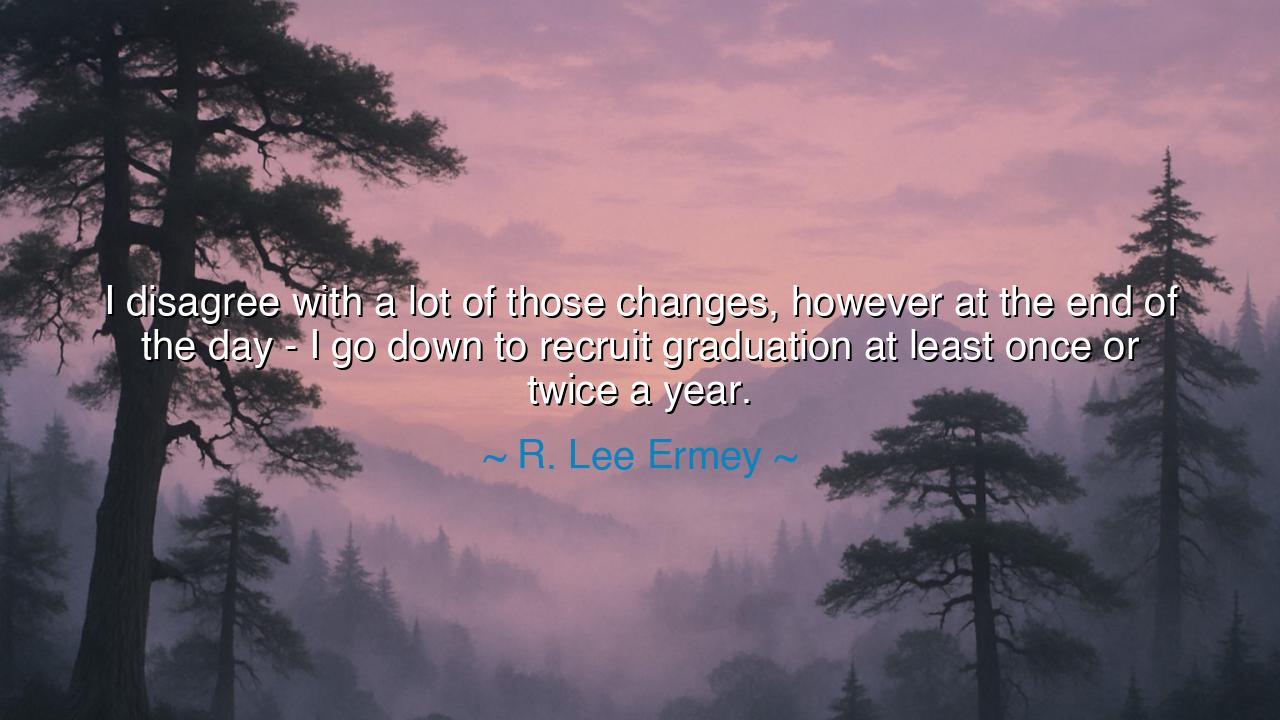
I disagree with a lot of those changes, however at the end of the
I disagree with a lot of those changes, however at the end of the day - I go down to recruit graduation at least once or twice a year.






In the rugged and grounded words, “I disagree with a lot of those changes, however at the end of the day – I go down to recruit graduation at least once or twice a year,” R. Lee Ermey speaks from the voice of a warrior tempered by both discipline and nostalgia. Beneath his direct and unpolished tone lies the wisdom of one who has lived through the transformations of his craft — a man who has seen the military evolve, adapt, and change, yet who remains anchored to its unchanging core: the honor of service and the brotherhood of soldiers. This is not a statement of rebellion, but of reverence — the cry of a soldier who loves his institution deeply enough to question it, yet faithfully enough to return to it again and again.
The origin of this quote finds its roots in Ermey’s long journey as both a real-life Marine and a symbol of military spirit in American culture. Before he was known to the world as the unforgettable Gunnery Sergeant Hartman in Full Metal Jacket, Ermey was a real U.S. Marine drill instructor, forged in the crucible of Vietnam-era service. He witnessed firsthand the harshness, the camaraderie, and the transformation of military training over decades. When he speaks of “disagreeing with changes,” he refers to the shift in tone and toughness within modern military instruction — a change from the rigid, uncompromising discipline of his generation to the more measured, psychological approaches of the present. Yet even in disagreement, Ermey does not turn his back. His heart remains loyal to the institution that made him who he is, returning “once or twice a year” to witness recruit graduation, to honor the continuation of the legacy.
This is the mark of a true traditionalist — not one who clings blindly to the past, but one who loves it enough to measure the present against it. Ermey’s words echo an ancient sentiment found among the warrior-philosophers of history. When Spartan veterans returned to see new generations of soldiers training, they too must have seen softer techniques, different tactics, new ways that seemed foreign to the old code. Yet the wise among them understood: though the armor may change, the heart of courage remains the same. Ermey embodies this same perspective. He may question the methods, but never the spirit — and his presence at every graduation symbolizes the timeless bond that links all warriors, old and new.
His words also remind us that disagreement does not mean disloyalty. The modern world often mistakes criticism for betrayal, but the ancients knew better. The Roman general Cato the Elder, though often critical of the changing morals of Rome, never ceased to serve it. His dissent was a form of devotion — a call to remember virtue in the midst of progress. Likewise, Ermey’s return to the recruit field, despite his disapproval of certain changes, shows that love for a tradition is proven not by blind approval, but by continuous engagement. His yearly pilgrimage to the ceremony of young Marines is not nostalgia — it is an act of faith in the next generation.
The deeper meaning of Ermey’s quote speaks to all who live through change — not just soldiers. Every craftsman, teacher, leader, or artist eventually watches the world evolve beyond their ways. The tools, language, and values shift; what once felt sacred now feels uncertain. Yet Ermey teaches that even amid disagreement, one can still find continuity through purpose. The form of the institution may change, but its soul endures. To visit it, to honor it, to guide its youth — these are acts of guardianship, not surrender.
There is also an undercurrent of humility in his words. Though a man of immense pride and strength, Ermey’s statement — “I go down to recruit graduation” — is a gesture of respect for the young. He, the seasoned warrior, comes not to command, but to witness. He knows that every generation must find its own way of carrying the torch. The older warrior’s role is not to stop the tide, but to remind those who come after of the values that must never fade: courage, honor, endurance, and brotherhood. His act of showing up, even quietly, is itself a teaching — that presence matters more than judgment, and that legacy is built not by control, but by continuity.
The lesson in R. Lee Ermey’s words is clear: hold fast to your principles, but do not withdraw from the world when it changes. To disagree with transformation is natural, but to abandon it is failure. Stand near the next generation — teach them, observe them, support them, even as you wrestle with the discomfort of progress. For in doing so, you ensure that what is best in the old survives within the new.
And the practical action is this: when the institutions, crafts, or ideals you love begin to change, do not retreat into bitterness. Instead, remain present. Go to the “graduations” of your field — the beginnings, the milestones, the renewals. Share your wisdom, your doubts, your respect. Be both guardian and witness, as Ermey was. For the world will always evolve, but the steadfast heart that returns — even in disagreement — becomes the bridge between what was and what will be.






AAdministratorAdministrator
Welcome, honored guests. Please leave a comment, we will respond soon